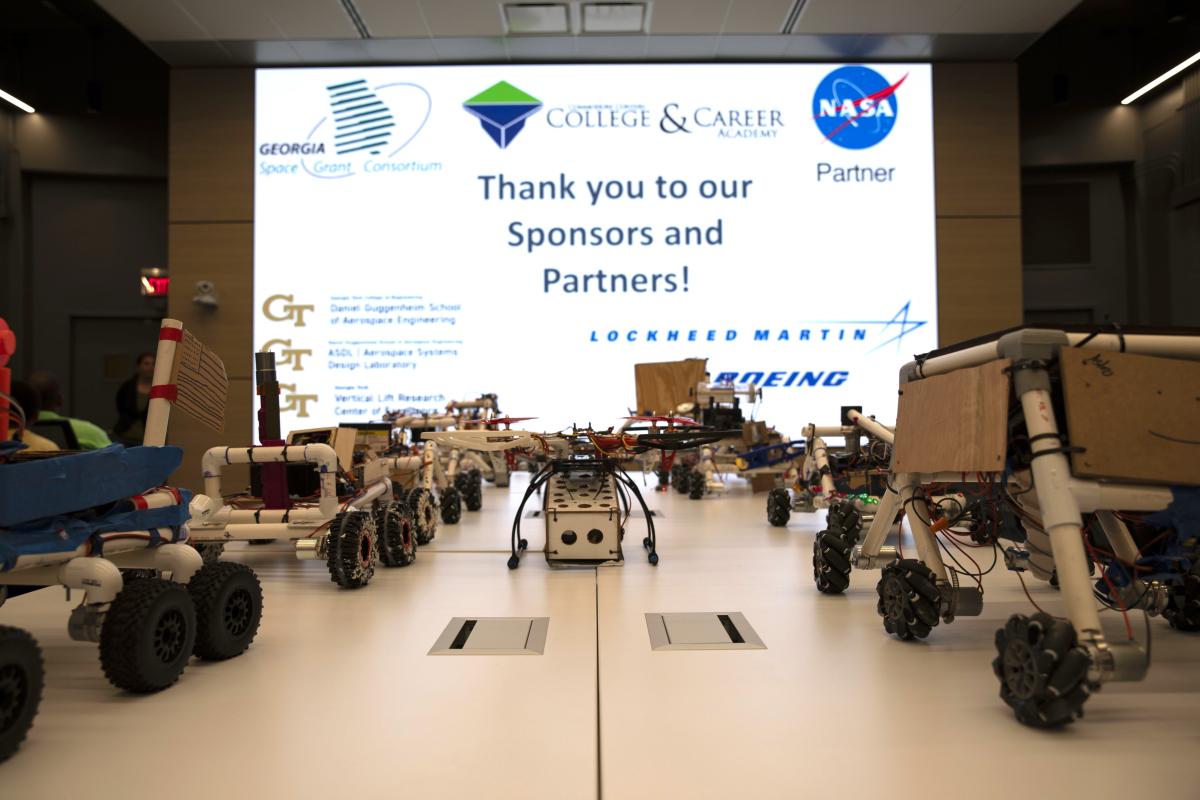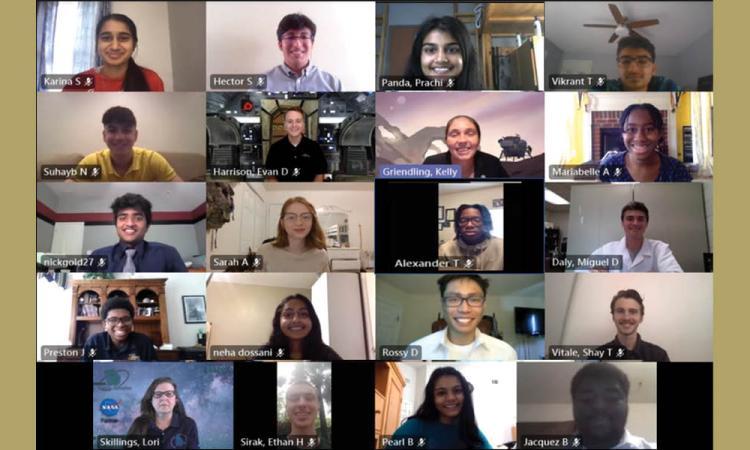The program expands to serve a new community.
Griendling working with students at the Atlanta STEP Camp
While some teenagers were lounging in the pool this summer, the Science, Technology, and Engineering Program (STEP) campers were building Mars rovers and operation-based drones. Now in its ninth year, the STEP Program at Georgia Tech is a free summer camp where high school students learn the engineering design process by completing task-based challenges.
This year, for the first time, the camp hosted two sessions. One in Albany, Georgia, to serve the state’s rural population, and the other on the Georgia Tech Atlanta campus. The participants in Albany were challenged to design a delivery drone, while those in Atlanta built rovers for Mars.
“I want students to walk away from this camp with confidence in their abilities, knowing that they can go to college and be engineers," said Lecturer Kelly Griendling, who leads the program and has been doing so for years.
The program is sponsored by the Daniel Guggenheim School of Aerospace Engineering (AE), Aerospace Systems Design Lab (ASDL), Georgia Space Grant Consortium, Lockheed Martin, and Boeing.
The program expanded to a second location thanks to the support of the Vertical Lift Research Center for Excellence, the Center for Advanced Machine Mobility (CAMM) through the outreach component of their NASA University Leadership Initiative (ULI) grants, and the 4C Academy.

Rovers on display
Mars Rovers-Coming Right Over
43 high schoolers from the Metro Atlanta area came to the STEP camp amped up to learn about aerospace engineering. They were divided into ten teams tasked with designing a rover that could complete a NASA-inspired mission on Mars. The young scientists had to write the requirements for the rover, design it, and build it, and each rover was different. Teams presented their work at the camp’s conclusion, showcasing their creations to an excited audience of parents, siblings, teachers, and Georgia Tech employees.
To build their rovers, they used various-sized motors, PVC, wood, and metal. Some teams even used springs to create suspension systems. They could select sensors, cameras, LiDAR, GPS, temperature sensors, and pressure sensors based on the team's specific assignment. They also printed 3D parts in the Yang Aero Maker Space with the assistance of Georgia Tech mentors.
The challenge wasn’t easy, but students could rely on mentors to help overcome project setbacks. Mentors included 15 undergraduate and graduate AE students, and GSGC staff. Everyone worked together to make sure the rovers were fully operational. They tested their rovers in the lengthy halls of the Montgomery Knight building. There were two high school teachers who helped from the GIFT program, thanks to the Center for Education Integrating Science, Mathematics, and Computing (CEISMIC).
Testing rovers in the MK hallways.
Working in the Yang Aero Maker Space
It's a Bird; it's a Plane. No, it's a STEP Drone
The program added a full session in Albany, Georgia where they hosted fourteen high school students at the 4C Academy. The STEM school location provided the perfect backdrop to construct their drones. The facility included a room with workstations (stocked early by volunteers) and a STEM gym for them to test and fly their drones. AE Ph.D. student Vinodhini Comandur led a team of five STEP mentors.
Campers were challenged with solving a real-life issue in their community using drone delivery methods. Projects ranged from delivering medical equipment to carrying life vests to flood disaster areas. They assembled drones in a standard process, but they could choose different motors and propellers based on the payload they needed to carry. With the drone kit as the base, they were free to make modifications within the acceptable physics of drone construction to carry their payload.
Once they’d successfully built their drones, the young engineers were overly cautious about crashing them, but mentors had to help them understand the nature of testing and research.
“On the first day of flight, we were hoping they would flight test and crash more because that’s how you learn the limits of the drone. You will likely have to replace the parts or redesign the payload based on these flight tests. They would do one flight lift-up and think they were successful. We told them no; you need more testing. To remedy it, we created a course for them to fly, and there were far more crashes and rebuilding,” Comandur shared.
Comandur, who specializes in pilot workload during shipboard landing, teaches in the undergraduate control lab and was approached by Professor Adam Steinberg about working in the STEP camp. She spoke with Professor Griendling to learn about the camp and was excited about taking a leadership role after the conversation.

AE Ph.D. student and Team Leader Vinodhini Comandur
2023 Albany Students
On-the-Job Training for Mentors
The AE mentors who work for the STEP camp get extremely valuable experience. Most of them come in without extensive robotic experience, so they learn many engineering skills in setting up the STEP camp. Before camp starts, they have to learn to do the project themselves so that they can mentor. They design and build their rovers and drones and troubleshoot their projects.
“I tell them, this is one of the few times in your life when somebody will offer to pay you to just learn as much as you can. In eight weeks, your job is to become an expert on robotic systems,” Griendling explained.
Through mentoring others, they understand their subject matter on a deeper level. In addition to the technical skills, they are strengthening their teaching and communication skills.
The AE mentors recognize the importance of the program. Griendling shared that over the years, the mentors have commented that they wished they had this type of program when they were in high school, and it's why some of them are involved.
Mentors from Atlanta STEP Camp
Mentors
All's Well That Ends Well
Many of the high schoolers who participate in the STEP camp go to college, and some choose engineering or other STEM disciplines like computer science.
“I will never forget, years ago, we had a student who was sure on the first day of camp that he was never going to college. Fast forward to today, and he has an electrical engineering degree from Kennesaw State University. Another one was unsure whether to pursue engineering. Still, by the end of the camp, she organized a group from the program to enter the Conrad engineering challenge. They did it independently but ended up in the top ten nationally and received an innovation award. Now, she is at MIT helping in their summer program. I know this program is making a difference,” Griendling shared.
Check out more pictures from the 2023 STEP Camp.
Related Stories

One STEP Closer to Mars
The 2021 STEP Camp virtually hosted 21 Georgia high school students in a crash course focused on the engineering design process and thinking like an aerospace engineer.
STEP Camp @ Georgia Tech: Educating Tomorrow's Aerospace Engineers
The AE School's Aerospace Systems Design Lab (ASDL) introduced 16 Atlanta-area high school students to college-level engineering this summer during the sixth annual Science, Technology, and Engineering Pipeline (STEP) camp, June 10 -27.
